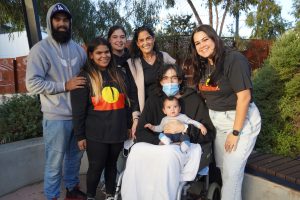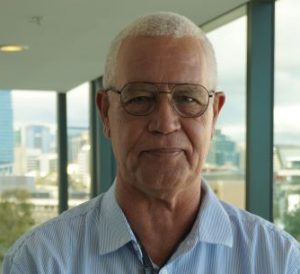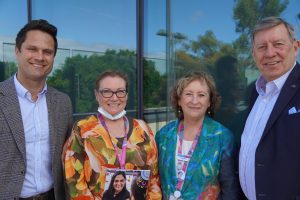Access to vital dialysis has been made a little easier for Aboriginal and Torres Strait Islander renal patients, with two new dialysis chairs opening at accommodation and health service Kanggawodli.
Rather than having to travel to hospital for regular dialysis, consumers can access treatment in a culturally safe environment at Kanggawodli (meaning Caring House).
Bluey’s story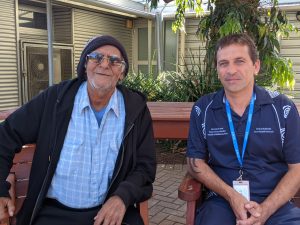
Renowned artist and proud Ngarrindjeri man Donald “Bluey” Roberts (pictured left) has been on dialysis for three year and says it’s a welcoming space.
“The staff are great here, they’re like family,” he said. “It’s great to see other people from different places.
“I wasn’t too good when I first came and I’d say I’m not too bad now, I feel a lot better.”
Aboriginal Health Practitioners, including Brenton Wilson (pictured right), are supporting the two-chair unit to ensure consumers receive the best possible care from a culturally and clinically capable workforce.
Engaging consumers
Renal Complex Care Nurse Consultant, Brian Farmer (pictured below), said particularly for patients starting on dialysis, it can be challenging to navigate the health system.
“Having dialysis available at Kangawoddli gives our patients an easily accessible culturally safe space to dialyse, so we hope it will really improve their experience and engagement with the health system,” he said.
“Patients with kidney disease need dialysis most days for several hours to remove fluid and toxins from the body, which the kidneys can no longer do.
“It’s an ongoing treatment and important that patients don’t miss a session, so it’s excellent to be able to provide this service in an appropriate and safe space for consumers.”
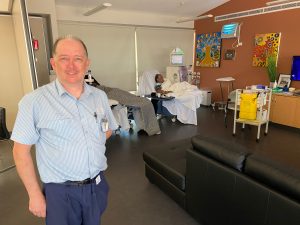
Partnerships
The move has been a joint effort with the Northern Adelaide Local Health Network (NALHN) and has been driven by patients, following consumer engagement activities organised by the aKction group (Aboriginal Kidney Care Together-improving outcomes now).
Feedback highlighted that culturally safe and appropriate facility for patients to receive dialysis was one of the main priorities.
Through the new joint pilot, Central Northern Adelaide Renal and Transplantation Service (CNARTS) will be responsible for providing clinical care, while NALHN’s Watto Purrunna Aboriginal Health Service will provide accommodation, transport and other support services for dialysis consumers at Kanggawodli.
Improving outcomes
NALHN Executive Director of Aboriginal Health, Kurt Towers, said it’s hoped that the pilot will help improve access and attendance, and support our Aboriginal and Torres Strait Islander consumers to return to their home town for ongoing treatment.
“Aboriginal and Torres Strait Islander consumers have said they often feel isolated within the typical hospital setting and as a result, are less likely to attend appointments and keep up with their care,” Mr Towers said.
“Kanggawodli is a 24/7 Aboriginal-managed health service providing primary health and clinical care in a residential settings for Aboriginal and Torres Strait Islander consumers, and particularly for those travelling to Adelaide from regional areas.
“We have listened to our community and collaborated with our consumers on a solution that we feel is more culturally appropriate and will reduce avoidable hospital admissions by keeping people connected and more informed about their care.”

